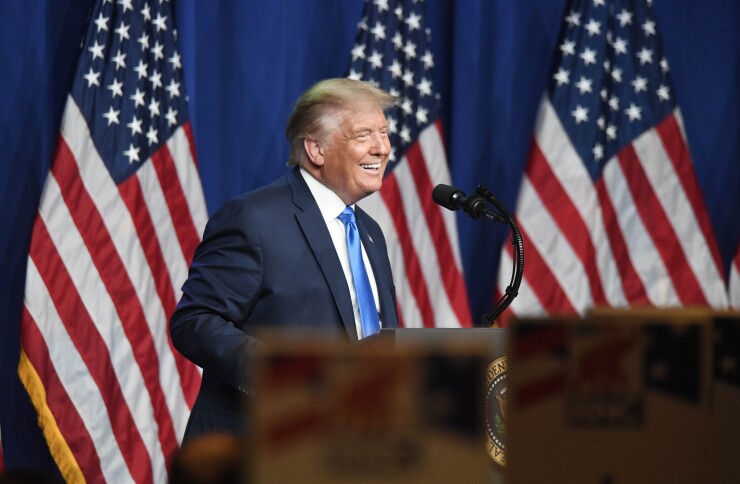
President Trump’s vague position on future investment in infrastructure has been compounded by the Republican National Committee’s
By default, the professionals in the public finance sector are left to pore over Trump’s past record and the presidential bare-bones
Under the category of “Innovate for the Future,” the campaign also lists "win the race to 5G and establish a national high-speed wireless network; continue to lead the world in access to the cleanest drinking water and cleanest air, and partner with other nations to clean up our planet’s oceans."
Rounding out the "innovate" section is the launch of Space Force, the establishment of a permanent manned presence on the moon, and sending the first manned mission to Mars.
Trump’s first term instead has been highlighted by the termination of the tax exemption for advance refunding and enactment of a lower corporate tax rate that made munis less attractive as an investment.
That came as part of the Tax Cuts and Jobs Act signed into law during his first year in office.
“Obviously, the administration and the Congress did no favors for the public finance community in the 2017 tax act with the elimination of advance refunding,” said Dee Wisor, an attorney at Butler Snow in Denver. “And of course, there was the near elimination of private activity bonds.”
Wisor noted that Trump “has been talking about infrastructure since the 2016 campaign and nothing has happened.”
“There have been a lot of infrastructure weeks in Washington since 2016, many of which I was there for,” said Wisor, a past president of the National Association of Bond Lawyers. “Perhaps some will blame partisan gridlock, but in his first two years the Republicans controlled all the levers of power, so one wonders why an infrastructure bill did not pass. So, I am not hopeful that the president will lead on this issue even if it helps with recovery.”
Wisor said his hope instead is for more bipartisan support in Congress on matters involving public finance such as the bipartisan bills introduced by Sens. Roger Wicker, R-Miss., and Michael Bennet, D-Colo., to restore the tax exemption for advance refunding and to create new direct-pay bonds.
Squire Patton Boggs partner Bob Labes said there’s also a question of how distracted or focused Trump will be should he win re-election.
“He appears to have been spending much of the past year focused on taking measures that will enhance his re-election, without articulating more of a substantive, comprehensive domestic policy agenda,” Labes said in an email. “If he achieves re-election, it would seem that he and his advisers will have the time, opportunity, and need, to try to develop, articulate and implement a more substantive domestic policy. Whether that happens, or the president remains distracted with personal legal battles, Twitter disputes, and pursuing personal grievances, remains to be seen.”
Trump’s interest in infrastructure could heighten if the economy falters through 2021.
Republicans had majority control of the House and Senate during the administration’s first two years in office, but the White House proposal unveiled in early 2018 was dead on arrival in Congress.
Efforts by the Trump administration to negotiate a major infrastructure deal after Democrats took majority control of the House in 2019 failed.
House Democrats forged ahead on their own, passing the muni-friendly Moving Forward Act in July on a 233 to 188 vote with the support of only 3 Republicans. Senate Republicans are refusing to consider that legislation and haven’t passed an alternative.
Trump has endorsed a more limited surface transportation bill in the Senate that had unanimous support in committee last year, but has remained silent on how to finance it or bring it to a Senate vote.
On a practical basis, the agenda of the party that wins the White House is driven by the president and not by the party platform that was written at the convention.
In 2016 the Republican National Committee published a 54-page platform that called for a drastic change in the Highway Trust Fund that would eliminate federal formula support for mass transit.
As this week’s Republican National Convention opened, the Trump campaign discussion of the financial health of cities has been focused on the recent success in attracting private investment in low-income census tracts designated as Opportunity Zones.
However, the more urgent need expressed by state, county, and municipal government officials for additional direct federal aid to close their revenue shortfalls and additional expenses of addressing the COVID-19 pandemic has not been addressed.





